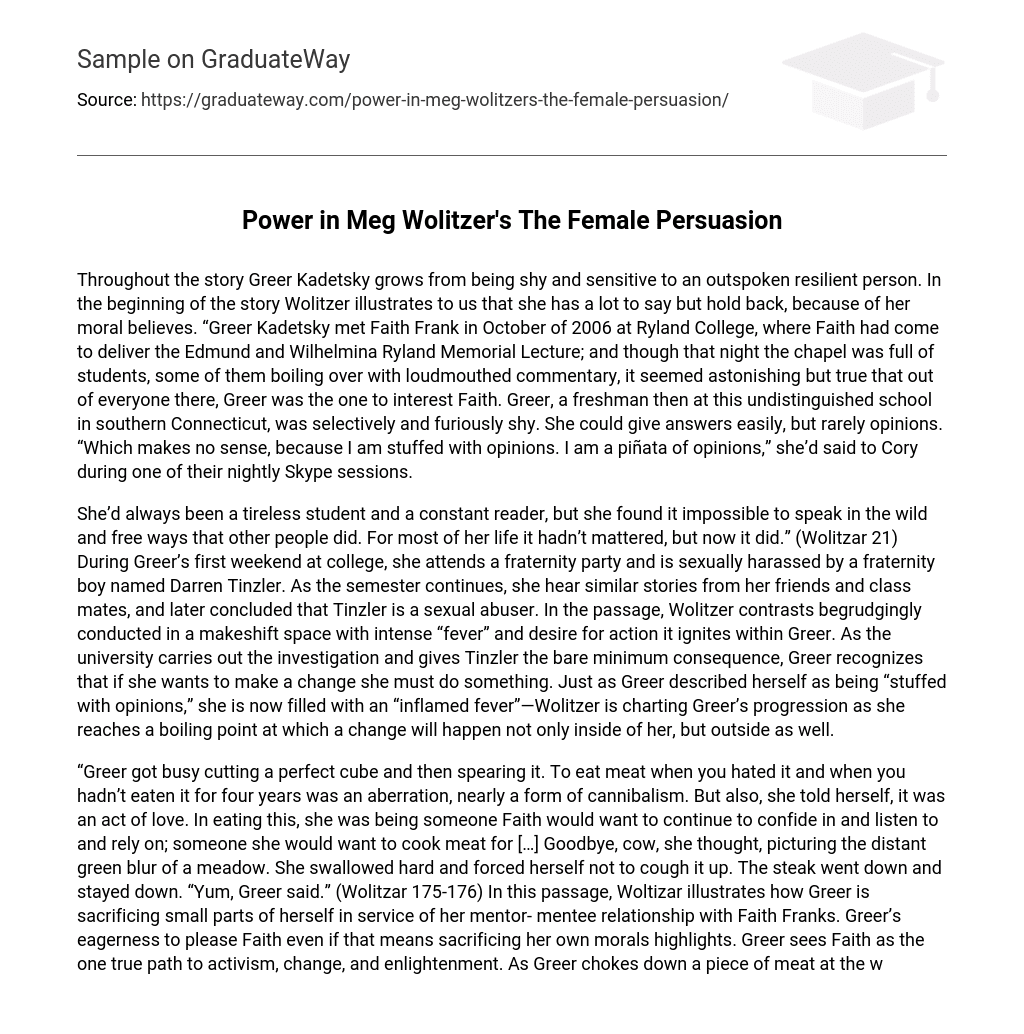Throughout the story Greer Kadetsky grows from being shy and sensitive to an outspoken resilient person. In the beginning of the story Wolitzer illustrates to us that she has a lot to say but hold back, because of her moral believes. “Greer Kadetsky met Faith Frank in October of 2006 at Ryland College, where Faith had come to deliver the Edmund and Wilhelmina Ryland Memorial Lecture; and though that night the chapel was full of students, some of them boiling over with loudmouthed commentary, it seemed astonishing but true that out of everyone there, Greer was the one to interest Faith. Greer, a freshman then at this undistinguished school in southern Connecticut, was selectively and furiously shy. She could give answers easily, but rarely opinions. “Which makes no sense, because I am stuffed with opinions. I am a piñata of opinions,” she’d said to Cory during one of their nightly Skype sessions.
She’d always been a tireless student and a constant reader, but she found it impossible to speak in the wild and free ways that other people did. For most of her life it hadn’t mattered, but now it did.” (Wolitzar 21) During Greer’s first weekend at college, she attends a fraternity party and is sexually harassed by a fraternity boy named Darren Tinzler. As the semester continues, she hear similar stories from her friends and class mates, and later concluded that Tinzler is a sexual abuser. In the passage, Wolitzer contrasts begrudgingly conducted in a makeshift space with intense “fever” and desire for action it ignites within Greer. As the university carries out the investigation and gives Tinzler the bare minimum consequence, Greer recognizes that if she wants to make a change she must do something. Just as Greer described herself as being “stuffed with opinions,” she is now filled with an “inflamed fever”—Wolitzer is charting Greer’s progression as she reaches a boiling point at which a change will happen not only inside of her, but outside as well.
“Greer got busy cutting a perfect cube and then spearing it. To eat meat when you hated it and when you hadn’t eaten it for four years was an aberration, nearly a form of cannibalism. But also, she told herself, it was an act of love. In eating this, she was being someone Faith would want to continue to confide in and listen to and rely on; someone she would want to cook meat for […] Goodbye, cow, she thought, picturing the distant green blur of a meadow. She swallowed hard and forced herself not to cough it up. The steak went down and stayed down. “Yum, Greer said.” (Wolitzar 175-176) In this passage, Woltizar illustrates how Greer is sacrificing small parts of herself in service of her mentor- mentee relationship with Faith Franks. Greer’s eagerness to please Faith even if that means sacrificing her own morals highlights. Greer sees Faith as the one true path to activism, change, and enlightenment. As Greer chokes down a piece of meat at the weekend retreat at Faith’s house in the country, she is conscious of the ways in which she is betraying her own ideas in service of Faith’s nebulous mission “fight” for women. Although Greer knows she is sacrificing her own values, she seems to think she is doing so for feminism not out of doe eyed admiration for Faith. In addition, by equating eating meat to “nearly cannibalism,” Greer unknowingly suggests that she would do anything for Faith, no matter how abhorrent. This scene contains one of the many hypocritical sacrifice of values that will dog Faith and Greer throughout their mentorship and partnership in the years to come.
In The Female Persuasion, the main characters’ families are almost all struggling with intense issues related to trauma, pain, inadequacy, and shame. Greer Kadetsy’s stoner parents find themselves bewildered and intimidated by their type-A, go-getter child. Greer seeks refuge in her boyfriend Cory Pinto’s family, who provide a haven of relative stability, normalcy, and encouragement hat is, until Cory’s younger brother Alby dies in a tragic accident. Greer has always felt distant from her parents.
Greer, a strict vegetarian since the early days of college, forces herself to eat meat in order to fit in during a weekend trip up to Faith’s country house. Once Greer has compromised her identity and values in this way to secure approval from this new “family,” she soon goes along with everything else demanded of her at Loci. She even considers turning a blind eye when it is revealed to her that the mentorship program which the organization purportedly established for a group of refugee women in Ecuador does not, in fact, exist, even though Loci has been touting its success. Greer’s desire to find a group of people who truly understand her backfires. All her life she conceived of what it would look and feel like to find a community of people whose intellect, social awareness, and feminist values would align with hers, but she eventually comes to find that what may at first appear to be a tight-knit, reliable group of people is often just as fractured as the strange family she left behind.





